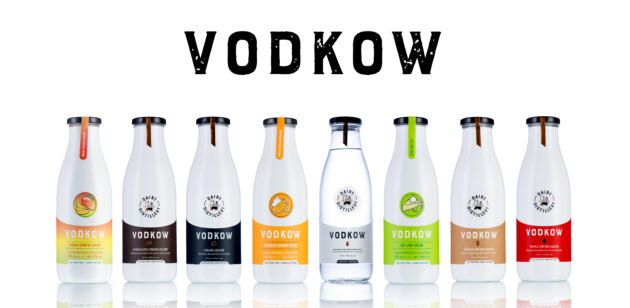
Canada’s investment landscape
By Jane Dummer
Business Operations Dairy Distillery Editor pick Food innovation Ontario SpatulaThe time is now to invest in Canadian food and beverage companies
 The Spatula team on the Dragons’ Den show. Photo © Spatula
The Spatula team on the Dragons’ Den show. Photo © Spatula Consumer trends such as sustainability, health and quality convenience are increasing demand for new, innovative products in the food and beverage sector. Taking an innovative idea to a scalable business involves focus, time, and money. What are the options when it comes to the financial part of the equation?
First up, Canadian financial institutions and banks. However, they can be risk adverse especially for early stage food and beverage companies. Another option is to access government funding. There are a variety of government funding programs available for Canadian food and beverage start-ups. A few mentions are the AgriInnovate program, Canadian Food Innovation Network, Natural Products Canada, Protein Industries Canada, and the National Research Council of Canada Industrial Research Assistance Program for small and medium-sized businesses.
Plus, there are numerous accelerator and incubator programs across the country. Mike McNeil, vice president, Venturepark Labs, emphasizes the importance of supporting Canadian entrepreneurs. “For too long, we’ve relied on shipping our raw ingredients outside our borders and repurchasing those products after they are commercialized. We must support entrepreneurs here in Canada by opening doors for them and building a large community to guide them on their journey,” he says.
What about venture capitalists and private investors? Is there an investing landscape for these food and beverage innovators to access? Omid McDonald, founder, Dairy Distillery, explains, “The money is out there. I raised money for my previous software companies, and I did not find raising money for a food and beverage company any more difficult. I found it was easier to get bank financing when I focused on the hard assets needed for a food and beverage business. There are many government support programs and venture capitalists (VCs) focused on food and beverages. I was fortunate to connect with AgCapital Canada that invests in promising Canadian agritech companies. In 2023, we pitched our story on CBC’s Dragons’ Den and attracted the attention of Manjit Minhas. We’re in discussions with Manjit’s team and have already started doing business together. Don’t be shy to tell your story. Investors are looking for both great financial returns and a good story to tell their friends.”

The Dairy Distillery team pitching their Vodkow product on Dragons’ Den. Photo © Dairy Distillery
Wallace Wong (The SixPackChef), co-founder, Spatula, describes, “My experience with investors and funding opportunities in Canada is that the community is small, concentrated, and exciting. It reminds me a lot of the restaurant industry; everyone is in the loop with things, and everyone is trying to improve and push the community. For example, one thing I’ve noticed is that people are always looking for opportunities. Canada is home to so many talented and incredible founders but even more so, hustlers! I look at this as an amazing aspect because it shows excitement, growth, diversity, and activity. My co-founder Ian Weng does a great job in continuously staying part of the community, driving conversations and being in tune with the VC environment.”
Ian Weng, CEO, Spatula, highlights, “In 2023, the Spatula team slayed the Dragons on CBC’s Dragons’ Den, receiving investment offers from all five Dragons. Our innovative flash-frozen meal kits wowed the Dragons. After receiving escalating bids, our team ultimately accepted a $500,000 (for 10 per cent equity) deal with our dream Dragon, Arlene Dickinson. One of the goals of this investment is to expand across Canada and into large box grocery retailers.”

Dairy Distillery produces Vodkow, an alcoholic beverage manufactured using upcycled milk permeate. Photo © Dairy Distillery
Accessing investment
At the beginning, it takes dedication, hard work, and a continuous daily effort to raise funds for a new business. This can be difficult when you need to be working in the business simultaneously. Some food and beverage start-ups are finding success accessing investment outside of Canada. Jake Karls, co-founder, Mid-Day Squares, describes his experience, as Canadian banks and VCs were being on the risk adverse side when it came to investing in homegrown innovative, scalable food and beverage companies.
“Canada has incubators, government programs with process and tools, however, we found a definite risk adverse mindset and very little in the way of funding for early stage food and beverage companies. Mid-Day Squares was rejected many times as too risky, too early with the common phrase ‘wait until you are profitable’. Currently 80 per cent of our funding is coming from outside of Canada and 20 per cent of funding is coming from Canadian VCs and angel operators,” he shares.
How can Canadian investments for food and beverage companies be encouraged and increased? Karls recommends, “A shift in mind-set to take a risk and invest in early stage companies. More private entrepreneurs need to reinvest and take a risk on start-ups; to raise awareness and celebrate successful entrepreneurs in Canada. One of our goals is to encourage a culture of entrepreneurism in Canada in the CPG space. And eventually, we will reinvest in Canadian early stage food and beverage companies.”
McDonald suggests, “I have met a lot of people who want to support their local food and beverage start-up but are not aware of the tax advantages of investing in them. A guide explaining the investor tax advantage would be helpful. Also, I found a lack of networking events in food and beverage sector compared to high-tech. Networking events that connect investors with directly to companies seeking funds. These events could be held alongside local experiences such as fairs and festivals to attract potential investment.”
Wong explains, “One opportunity for Canadian food and beverage companies accessing local funding and investors is to recognize the foreign recognition of the ‘Canadian brand – Made in Canada’ is still on the uprise and strong. As a result, the demand for Canadian products, especially items that are consumable, are on the rise. The ability to not only create a domestic product for Canadian consumers, but also to be able to market to foreign demographics will help in growth and in parallel show exciting promise and value to potential investors.”
The time is now to encourage a Canadian culture of food and beverage entrepreneurs and foster a community of investors for those entrepreneurs meeting the evolving trends and needs of consumers domestically and internationally.
This article was originally published in the February/March 2024 issue of Food in Canada.
Print this page